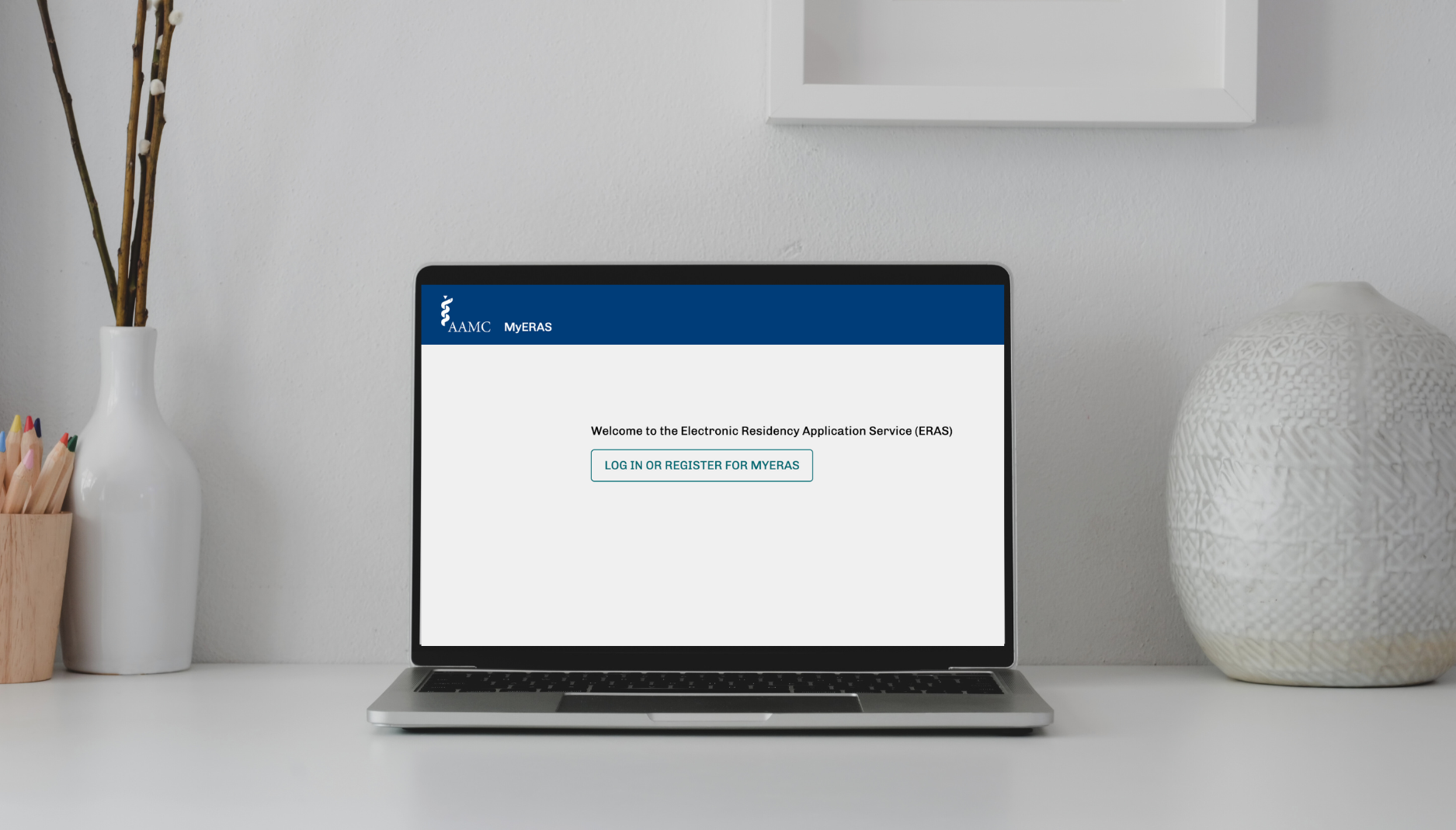What to Know About the New 2024 MyERAS Application
- by
- Jul 18, 2023
- Reviewed by: Amy Rontal, MD

As the academic year progresses, the journey of aspiring medical professionals reaches a critical juncture—the process of applying to residency programs. Each year, the Electronic Residency Application Service (ERAS) undergoes updates to enhance the application experience for hopeful applicants and streamline the selection process for residency programs’ staff members. This year, there have been changes made to three parts of the application: program signals, geographic preferences, and the impactful experiences section.
Below, I’ve included a hypothetical dialogue between a medical student and a residency advisor, the purpose of which is to explore these changes to the 2024 MyERAS application. Let’s dive in!
Navigating the 2024 MyERAS Application: A Counselor and Student Dialogue
[Scene: A cozy study room, adorned with medical textbooks and a whiteboard filled with colorful diagrams. A fire dances in the background as a seasoned residency counselor sits across his oversized armchair from a curious yet anxious cross-legged medical student, both eager to delve into the updates to the 2024 ERAS application…
Just kidding, this meeting happens over Zoom, both parties have blurred backgrounds and a bit of background noise]
Residency Counselor: Good morning! I understand you’re applying for residency this year. I wanted to talk to you about some changes to the MyERAS application for the 2024 cycle and how they can impact your application process. Let’s discuss them to make sure you’re prepared to navigate this year’s process successfully. Tell me, are you familiar with the updates?
Medical Student: Good morning! Yes, I’ve heard that there have been some changes to the 2024 MyERAS application, but I’m not entirely sure of the specifics. I would appreciate any information and advice you can provide.
RC: That’s why I’m here! The 2024 MyERAS application has introduced a few key changes to streamline the application process and make it more effective for both residency applicants and program directors. One of the major updates is the policy regarding program signals.
Program Signaling
MS: I see. Can you tell me, what exactly is signaling? And how will changes to it impact my application process?
RC: Let’s talk through it. Program signaling lets 2024 residency applicants indicate to participating programs that they’re interested. This isn’t in place yet for fellowship applicants, but that might change in the near future.
Students and applicants were already unofficially signaling before by sending letters of interest and completing away rotations. Now, applicants can officially signal through ERAS, though there is a limited number of signals you can send.
MS: OK. Could you elaborate a bit more on how this will specifically impact my application?
RC: Sure. Essentially, it means residency applicants applying to specialties and programs who opt to participate in program signals will now have the opportunity to express their interest in attending that program at the time of application.
MS: Alright. Thanks. I was also wondering, how exactly are signals used by the programs?
RC: Program signals are intended to be used by residency programs as a data point in deciding whom to invite to interview. It shows residency programs you are sincerely interested in them, and that can make it more likely they’ll decide to interview you. Of course, sending a program a signal doesn’t guarantee you’ll be invited for an interview.
MS: Right. And how many program signals do I have?
RC: It depends on the specialty in question. Applicants are allowed to send multiple program signals to indicate their interest. The average number of signals per specialty is 3 to 5, with competitive, surgical subspecialties having much more. For example, orthopedic surgery allows for 30 program signals.
MS: Alright. Any thoughts on how many signals I should use?
RC: The AAMC recommends that “applicants signal programs they are the most interested in using the allotted number of program signals, including home and away rotation programs. Use the maximum allotted program signals per specialty to which you apply. You should use all the signals available to you, and of course, decide which programs you want to signal based on your unique situation.”
MS: Got it. And what are your thoughts on signaling overall? What I mean is, what’s good about them, and is there anything to look out for?
RC: A positive is that program signaling will demonstrate commitment. By engaging in program signaling, you can show your strong interest and dedication to a specific residency program. This can help you stand out among other applicants and indicate that you have thoroughly researched the program and believe it aligns with your career goals.
However, it’s essential to approach program signaling with sincerity and professionalism. Be genuine in your expressions of interest and remember, while program signaling can be beneficial, it’s still only one aspect of the overall residency application process. Your qualifications and fit for the program remain crucial factors in the final selection and any negatives on your application will not be overlooked just because you signaled that program. Program signaling should be seen as a supplementary strategy to enhance your application, not a substitute for a strong academic record, clinical experience, letters of recommendation, personal statement, and interview performance.
MS: Great. Anything else I should know?
Geographic and Setting Preferences
RC: Yes, there’s more. Let me tell you about the geographic and setting preferences section of the MyERAS application. With this new feature, applicants will have the opportunity to communicate their preference or lack of preference for a particular geographic division and urban or rural settings.
The reasoning behind this change is that both program directors and applicants report that geographic location as one of the most important factors in residency program selection. The geographic and setting preference updates of the MyERAS application will offer applicants a structured process for expressing their preferences to complete residency or fellowship training in particular areas of the country, and/or in an urban, suburban, or rural setting.
MS: Wow, that seems a welcome change. How should I utilize it?
RC: Location and setting is very important for applicants. Think about where your support system is based. Think about where you want to work after you complete your residency or fellowship training. Furthermore, keep in mind the type of setting you’d like to train in, rural or urban, academic and research focused or not. Be honest when sharing your geographic preferences. Make sure they’re consistent with your signals.
MS: What if I don’t have a geographic preference?
RC: Great question! Although geographic preferences allow applicants to clearly communicate exactly where they want to be and why you want to be there, it also offers the opportunity to share with programs that you have no geographic preference and are willing and able to go anywhere for your training. If you have no preference regarding where you receive training, you should select “I do not have a division preference” and explain why you’re open to going anywhere.
Impactful Experiences Section
RC: I’d be remiss if I didn’t mention the updated “impactful experiences” section! Applicants will now be able to list on their MyERAS application as many as 10 experience entries that communicate who they are and what is most important to them. Applicants can designate up to three of these as their most meaningful experiences and briefly describe why. New experience types will be available to choose from along with more descriptive information about each entry. Applicants can describe any challenges or hardships that influenced their journey to residency. This could include experiences related to family background, financial background, community setting, educational experiences, and/or general life experiences. This section is intended for applicants who have overcome major challenges or obstacles.
MS: Wow, this is a lot to keep track of.
RC: I know, it seems like a lot of changes. But if this is your first time applying, you will not really have prior application experience to compare it to anyway.
MS: “…”
RC: Remember, when discussing your experiences, you must be selective. Don’t just word-vomit a bunch of tangentially relevant experiences. You will have to strategize and select how each can contribute to your application and make you a dedicated, competitive, and well-rounded applicant.
It’s also pivotal to familiarize yourself with the MyERAS application format and prepare your CV. And think about your application as you progress through medical school. I don’t mean you need to do everything possible to build out your CV, but you also can’t just simply coast by on passing classes and clerkships alone. It’s also a good idea to seek feedback from faculty or advisors on how to improve your extracurriculars.
Final Recommendations
MS: Thank you for explaining these changes. It’s definitely helpful to know what to expect. Sounds like I need to be thoughtful about my signaling, geographic preferences, and which experiences to highlight in my application. I feel more confident about dealing with these changes to the 2024 ERAS application. I’m eager to get started on it!
RC: Absolutely. It’s important to make every aspect of your application count. I would also advise you to thoroughly review the program mission statements and requirements so that your application is tailored to them.
MS: I’ll definitely keep that in mind. Thank you for clarifying these changes and for giving me a better understanding of what to expect with the 2024 MyERAS application.
RC: You’re welcome! Remember, preparation and attention to detail are key to a successful application. If you have any further questions or need additional guidance, feel free to reach out. Good luck with your residency application process!
Further Reading
The three major changes to the 2024 MyERAS application are related to program signals, geographic preferences, and the impactful experiences section. Overall, the updates are meant to help programs facilitate a more holistic review, improve the overall application screening process, and allow applicants who are genuinely interested in their programs an opportunity to convey their interest. Check the AAMC website for a holistic overview of all the 2024 MyERAS updates.
If you’re looking for more (free!) tips from Blueprint tutors to help you navigate the residency application process, check out these other articles from the blog:
- How to Make a Statement with Your ERAS Personal Statement
- Quiz: Should You Consider Residency Counseling?
- How to Maximize Your Chances of Matching With Your Dream Residency
- How to Get Standout Letters of Recommendation for Your Residency Application
- Residency Interview Tips & Tricks: The Ultimate Guide
About the Author
Mike is a driven tutor and supportive advisor. He received his MD from Baylor College of Medicine and then stayed for residency. He has recently taken a faculty position at Baylor because of his love for teaching. Mike’s philosophy is to elevate his students to their full potential with excellent exam scores, and successful interviews at top-tier programs. He holds the belief that you learn best from those close to you in training. Dr. Ren is passionate about his role as a mentor and has taught for much of his life – as an SAT tutor in high school, then as an MCAT instructor for the Princeton Review. At Baylor, he has held review courses for the FM shelf and board exams as Chief Resident. For years, Dr. Ren has worked closely with the office of student affairs and has experience as an admissions advisor. He has mentored numerous students entering medical and residency and keeps in touch with many of them today as they embark on their road to aspiring physicians. His supportiveness and approachability put his students at ease and provide a safe learning environment where questions and conversation flow. For exam prep, Mike will help you develop critical reasoning skills and as an advisor he will hone your interview skills with insider knowledge to commonly asked admissions questions.










